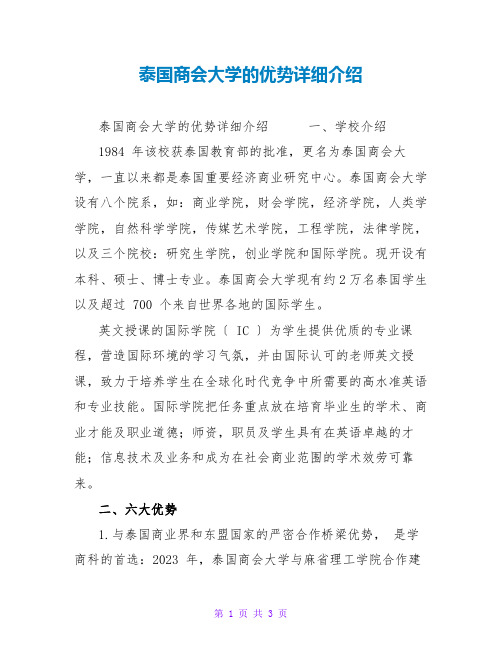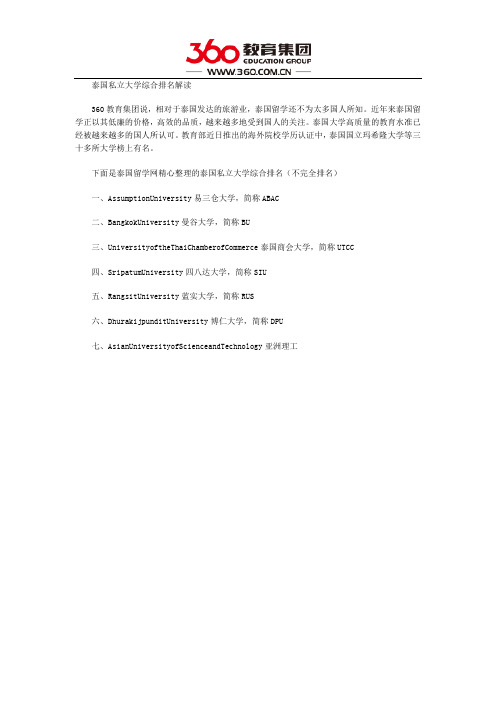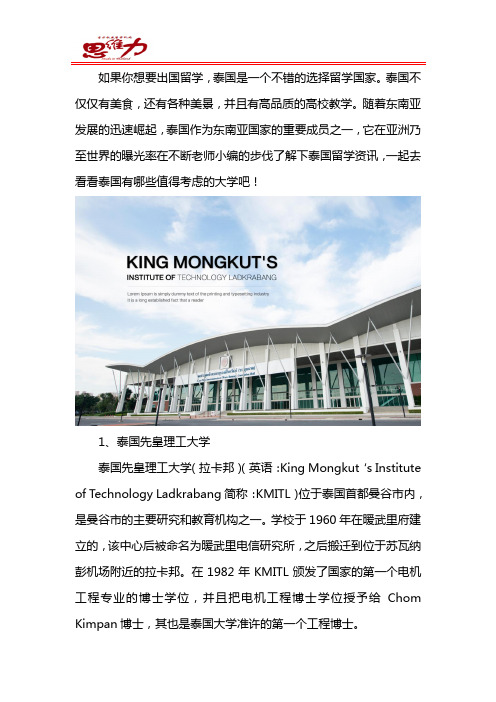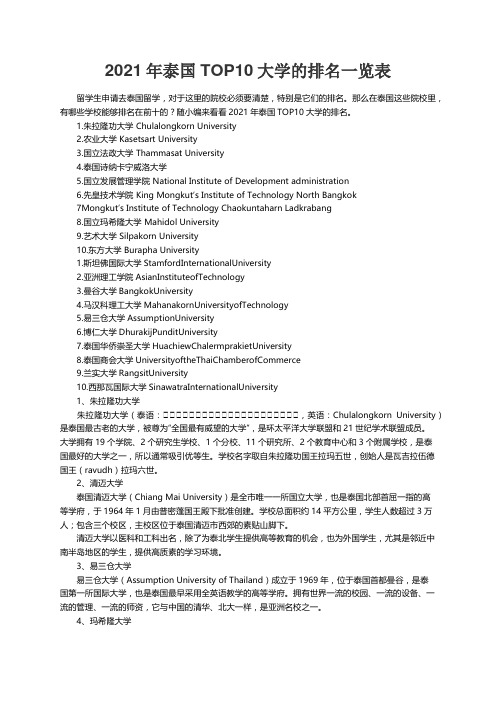泰国商会大学的排名
- 格式:docx
- 大小:33.67 KB
- 文档页数:1

泰国商会大学的优势详细介绍泰国商会大学的优势详细介绍一、学校介绍1984 年该校获泰国教育部的批准,更名为泰国商会大学,一直以来都是泰国重要经济商业研究中心。
泰国商会大学设有八个院系,如:商业学院,财会学院,经济学院,人类学学院,自然科学学院,传媒艺术学院,工程学院,法律学院,以及三个院校:研究生学院,创业学院和国际学院。
现开设有本科、硕士、博士专业。
泰国商会大学现有约2万名泰国学生以及超过 700 个来自世界各地的国际学生。
英文授课的国际学院〔 IC 〕为学生提供优质的专业课程,营造国际环境的学习气氛,并由国际认可的老师英文授课,致力于培养学生在全球化时代竞争中所需要的高水准英语和专业技能。
国际学院把任务重点放在培育毕业生的学术、商业才能及职业道德;师资,职员及学生具有在英语卓越的才能;信息技术及业务和成为在社会商业范围的学术效劳可靠来。
二、六大优势1.与泰国商业界和东盟国家的严密合作桥梁优势,是学商科的首选:2023 年,泰国商会大学与麻省理工学院合作建立创新驱动创业研究院〔IDEA〕,共同研发创新才能,创新驱动,以及创业生态系统。
2,大学名声优势:泰国商会大学国际学生多样性排名泰国第一〔超过 35 个国家的留学生〕泰国学生与外国留学生比例 = 20:1,泰国商会大学在接待入境交换生工程中排名第六。
3.数字化教学系统优势:泰国商会大学大量利用信息科技在教学中,作为一所卓越的苹果公司学术机构。
泰国商会大学免费发放最新版苹果平板电脑,额外装备了多个跟学习相关的软件如:数据搜集,分析^p ,设计等。
在 ITunes U 课程有 iBook 和其它相关的学习资料供同学们使用。
为了方便广阔师生,校园 24 小时覆盖快且稳定的网速。
此外,550 台电脑和打印机房供学生免费使用。
4.营造国际化的学习气氛优势:学生们将会有时机与来自世界各地的同学建立新联络。
全球教育方案/访问参观全球知名公司/泰国商会大学-友谊之旅〔遍布全球的校园访问旅行〕/国际家庭集体外出活动/各国节日活动/〔体验各国传统节日文化〕/你好!东盟〔与东盟学校的联谊活动/与海外大学的交换生工程〕。

泰国暹罗大学由Narong Mongkhonvanit 博士于1965年创建。
暹罗(XianLuo英文名Siam)是泰国的旧称。
四十多年来,暹罗大学秉承对学术的不断追求,从建校初的200名学生,发展到现有在校生15,000余名,其中包括中国留学生200余名,已成为泰国五大私立大学之一。
那么为什么有那么多留学生会选择去暹罗大学留学呢?今天泰国留学老师就为大家分享一下。
1、学术地位:泰国暹罗大学以著名的商务、经贸实力闻名于东南亚,并且国家重要经济商业研究中心也设立在该大学内,是泰国政府对国家经济风险评估、预算评估等数据的研究和发布的重要基地;是泰国政府商业部、工业部、财政部等公务员的培训基地;是东南亚高端商务人才的摇篮。
2、关于学历:泰国暹罗大学学历受中国教育部认可,同时还受到欧美23个国家认可,文凭含金量高,具有竞争力的就业优势。
3、关于就业:就读本校学生第四年将由泰国暹罗大学统一安排带薪实习,根据其不同专业及特长,可选择在泰国,中国、香港、澳门等地知名企业带薪实习3-6个月,优秀实习生可直接留在企业工作。
4、母语教学:全中文教学让你学习更轻松,全年英语泰语作为必修学分课程,真正节省学生留学前语言培训上耽误的时间;5、文凭含金量:除与国内同等学历学生享受同等待遇外,还可获得国家对留学生的特别优惠政策。
6、就业前景:泰国总商会拥有6000多家知名企业,为我校毕业学生打造一个国际化就业平台。
同时“一带一路”经济政策的推行,需要大量的中英泰三语人才。
7、费用低廉:泰国商会大学提供的国际教育课程,每年学费加生活费仅需5-6万人民币,等于或低于国内同等教育成本花费。
8、入学条件:无雅思、托福等语言考试要求,高中毕业(包括中专、职高、技校)或参加完高二会考合格,并能确保获得学校毕业证书。
9、留学直通车:直接招生,无任何中介费。
专人负责免费协助学生办理入学手续,签证申请,以及毕业后的学历认证手续等。
10、学生公寓:空调2人间,带独立的卫生间。

泰国私立大学综合排名解读
360教育集团说,相对于泰国发达的旅游业,泰国留学还不为太多国人所知。
近年来泰国留学正以其低廉的价格,高效的品质,越来越多地受到国人的关注。
泰国大学高质量的教育水准已经被越来越多的国人所认可。
教育部近日推出的海外院校学历认证中,泰国国立玛希隆大学等三十多所大学榜上有名。
下面是泰国留学网精心整理的泰国私立大学综合排名(不完全排名)
一、AssumptionUniversity易三仓大学,简称ABAC
二、BangkokUniversity曼谷大学,简称BU
三、UniversityoftheThaiChamberofCommerce泰国商会大学,简称UTCC
四、SripatumUniversity四八达大学,简称SIU
五、RangsitUniversity蓝实大学,简称RUS
六、DhurakijpunditUniversity博仁大学,简称DPU
七、AsianUniversityofScienceandTechnology亚洲理工。

如果你想要出国留学,泰国是一个不错的选择留学国家。
泰国不仅仅有美食,还有各种美景,并且有高品质的高校教学。
随着东南亚发展的迅速崛起,泰国作为东南亚国家的重要成员之一,它在亚洲乃至世界的曝光率在不断老师小编的步伐了解下泰国留学资讯,一起去看看泰国有哪些值得考虑的大学吧!1、泰国先皇理工大学泰国先皇理工大学(拉卡邦)(英语:King Mongkut‘s Institute of Technology Ladkrabang简称:KMITL)位于泰国首都曼谷市内,是曼谷市的主要研究和教育机构之一。
学校于1960年在暖武里府建立的,该中心后被命名为暖武里电信研究所,之后搬迁到位于苏瓦纳彭机场附近的拉卡邦。
在1982年KMITL颁发了国家的第一个电机工程专业的博士学位,并且把电机工程博士学位授予给Chom Kimpan博士,其也是泰国大学准许的第一个工程博士。
现如今,泰国先皇理工大学(拉卡邦)提供学士学位,硕士学位和博士学位的学习,学校占地约2500亩,目前在校生25000人左右,学校现有十六个学院,2个校区,一个在拉卡邦,一个在春蓬府乌冬撒。
学院如下:工程学院、建筑学院、科学学院、农科学院、工业技术教育学院、农工业学院、通讯科技学院、工商管理学院、艺术学院、护理学院、国际学院、拉卡邦科技学院、高等制造业创新学院、教育学创新学院、国际航空工业学院、音乐学院。
与2017年,在泰晤士报高等教育中排名位于泰国高等院校第五名(亚洲排名187-190)。
2、泰国曼谷皇家理工大学曼谷皇家理工大学(UTK),Rajamangala University of Technology Krungthep,位于曼谷市中心,是泰国规模最大的公立大学,校区位于泰国首都曼谷最繁华的商业中心(Silom),学校周边是世界五百强企业,四大会计事务所和各国大使馆及总领事馆,交通便捷,生活便利。
学校在校生一万三千多人,师资阵容强大,90%教师拥有名校博士学位和海外留学背景,并享有泰国皇室主持毕业典礼,颁发毕业证书的殊荣。

2021年泰国TOP10大学的排名一览表留学生申请去泰国留学,对于这里的院校必须要清楚,特别是它们的排名。
那么在泰国这些院校里,有哪些学校能够排名在前十的?随小编来看看2021年泰国TOP10大学的排名。
1.朱拉隆功大学 Chulalongkorn University2.农业大学 Kasetsart University3.国立法政大学 Thammasat University4.泰国诗纳卡宁威洛大学5.国立发展管理学院 National Institute of Development administration6.先皇技术学院King Mongkut‘s Institute of Technology North Bangkok7Mongkut’s Institute of Technology Chaokuntaharn Ladkrabang8.国立玛希隆大学 Mahidol University9.艺术大学 Silpakorn University10.东方大学 Burapha University1.斯坦佛国际大学StamfordInternationalUniversity2.亚洲理工学院AsianInstituteofTechnology3.曼谷大学BangkokUniversity4.马汉科理工大学MahanakornUniversityofTechnology5.易三仓大学AssumptionUniversity6.博仁大学DhurakijPunditUniversity7.泰国华侨崇圣大学HuachiewChalermprakietUniversity8.泰国商会大学UniversityoftheThaiChamberofCommerce9.兰实大学RangsitUniversity10.西那瓦国际大学SinawatraInternationalUniversity1、朱拉隆功大学朱拉隆功大学(泰语:จจจจจจจจจจจจจจจจจจจจจ,英语:Chulalongkorn University)是泰国最古老的大学,被尊为“全国最有威望的大学”,是环太平洋大学联盟和21世纪学术联盟成员。

中国教育部认证的泰国大学近日很多人问到中国教育部认证的泰国大学都有那些?而网上也确实没有找到一个完整的答案,为帮助出国留学泰国的学生正确选择学校,现将泰国学校加注如下:1) Bansomdej Chaopraya Rajabhat University (BSRU) 班颂德皇家大学2) Buriram Rajabhat University (BRU) 武里南皇家大学3) Chaiyaphum Rajabhat University (CPRU) 猜也奔皇家大学4) Chandrakasem Rajabhat University (CRU) 占塔拉卡什皇家大学5) Chiang Mai Rajabhat University (CMRU) 清迈皇家大学6) Chiang Rai Rajabhat University (CRU) 清莱皇家大学7) Dhonburi Rajabhat University (DRU) 吞武里大学8) Kalasin Rajabhat University (KSU) 加拉信皇家大学9) Kamphaeng Phet Rajabhat University (KPRU) 甘烹碧皇家大学10) Kanchanaburi Rajabhat University (KRU) 北碧皇家大学11) Kasetsart University (KU) 农业大学12) Khon Kaen University (KKU) 孔敬大学13) Lampang Rajabhat University (LPRU) 南邦皇家大学14) Loei Rajabhat University (LRU) 黎府皇家大学15) Maejo University (MJU) 梅州大学16) Mahasarakham University (MSU) 马哈沙拉堪大学17) Muban Chombueng Rajabhat University (MCRU) 庒棚皇家大学18) Nakhon Pathom Rajabhat University (NPRU) 佛统皇家大学19) Nakhon Phanom University (NPU) 那空农大学20) Nakhon Ratchasima Rajabhat University (NRRU )呵叻皇家大学21) Nakhon Sawan Rajabhat University (NSRU) 那空沙旺皇家大学22) Nakhon Si Thammarat Rajabhat University (NSTRU)那空是塔玛拉皇家大学23) Naresuan University (NU) 那黎宣大学24) National Institute of Development Administration (NIDA)国立发展管理学院25) Pathumwan Institute of Technology 巴吞弯理工学院26) Phetchabun Rajabhat University (PCRU 碧差汶皇家大学27) Phetchaburi Rajabhat University (PBRU) 碧武里皇家大学28) Phranakhon Rajabhat University (PNRU) 帕纳空皇家师范大学29) Phranakhon Si Ayutthaya Rajabhat University (ARU)阿育塔亚皇家大学30)Phuket Rajabhat University (PKRU) 普吉皇家大学31) Pibulsongkram Rajabhat University (PSRU) 披博宋甘皇家大学32) Prince of Songkla University (PSU) 宋卡王子大学33) Princess of Naradhiwas University (PNU) 娜拉媞瓦公主大学34) Rajabhat Maha Sarakham University (RMU) 玛哈沙拉堪皇家大学35) Rajabhat Rajanagarindra University (RRU) 拉差那卡琳皇家大学36) Rajamangala University of Technology Isan (RMUTI)东北皇家理工大学37) Rajamangala University of Technology Krungthep (RMUTK)泰国皇家理工大学38) Rajamangala University of Technology Lanna (RMUTL)拉加芒加拉科技大学39) Rajamangala University of Technology Phra Nakhon (RMUTP)帕纳空皇家技术大学40) Rajamangala University of Technology Rattanakosin (RMUTR)拉加曼加拉国家科技大学41) Rajamangala University of Technology Srivijaya (RMUTSV)威差亚皇家理工大学42) Rajamangala University of Technology Suvarnabhumi (RMUTSB)苏旺那蓬皇家理工大学43) Rajamangala University of Technology Tawan-Ok (RMUTTO)东方皇家理工大学44) Rajamangala University of Technology Thanyaburi (RMUTT)塔亚武里皇家理工大学45) Rambhai Barni Rajabhat University (RBRU) 兰帕潘尼皇家大学46) Roi-et Rajabhat University (RERU) 百艺皇家大学47) Sakon Nakhon Rajabhat University (SNRU) 沙功那空皇家大学48) Silpakorn University (SU) 艺术大学49) Si Sa Ket Rajabhat University (SSKRU) 四色菊皇家大学50) Songkhla Rajabhat University (SKRU) 宋卡拉皇家大学51) Srinakharinwirot University (SWU) 诗纳卡宁威洛大学52) Suan Dusit Rajabhat University (SDU) 宣都实皇家大学53) Suan Sunandha Rajabhat University (SSRU) 宣素那他皇家大学54) Surat Thani Rajabhat University (SRU) 苏拉塔尼皇家大学55) Surindra Rajabhat University (SRRU) 素林皇家大学56) Thammasat University (TU) 法政大学57) Thepsatri Rajabhat University (TRU) 苏拉坦尼皇家大学58) Ubon Rajathanee University (UBU)rajathanee 乌汶大学59) Ubon Ratchathani Rajabhat University (UBRU) 乌汶皇家大学60) Udon Thani Rajabhat University (UDRU) 乌隆皇家大学61) Uttaradit Rajabhat University (URU) 程逸皇家大学62) Valaya-Alongkorn Rajabhat University (VRU) 瓦拉雅阿隆空皇家大学63) Yala Rajabhat University (YRU) 也拉皇家大学64) Burapha University (BUU) 东方大学65) Chiang Mai University (CMU) 清迈大学66) Chulalongkorn University (CU) 朱拉隆功大学67) King Mongkut’s Institute of Technology Ladkrabang (KMITL)拉卡邦先皇技术学院68) King Mongkut’s University of Technology North Bangkok (KMUTNB)北曼谷先皇技术学院69) King Mongkut’s University of Techno logy Thonburi (KMUTT)国王科技大学70) Mae Fah Luang University (MFLU) 皇太后大学71) Mahidol University (MU) 玛希隆大学72) Suranaree University of Technology (SUT) 苏兰拉工业大学73) Thaksin University (TSU) 萨卡辛大学74) Walailak University (WU) 瓦莱岚大学75) Assumption University (AU) 易三仓大学76) Asian Institute of Technology(AIT)) 亚洲理工学院77) Asia Pacific International University 亚洲太平洋国际大学78) Bangkok University 曼谷大学79) Dhurakij Pundit University 博仁大学80) Huachiew Chalermprakiet University 华侨崇圣大学81)Kasem Bundit University 格森并列大学82) Payap University 西北大学83) Rangsit University 兰实大学84) Siam University 暹罗大学85) Sripatum University 斯巴顿大学86) University of the Thai Chamber of Commerce 商会大学。
朱拉隆功大学是泰国有名的高等学府,受到大家(dàjiā)的亲密关注。
很多小伙伴在选择留学院校的过程当中都会参考相关的排名情况来评估其含金量。
那朱拉隆功大学排名怎么样呢?来理解下。
一、朱拉隆功大学排名朱拉隆功大学是泰国最古老的大学,被尊为“全国最有声威(wēiwàng)的大学〞,环太平洋大学联盟和21世纪学术联盟成员。
该校拥有19个学院、2个研究生学校、1个分校、11个研究所、2个教育中心和3个附属学校。
学校名字取自朱拉隆功国王拉玛五世,创始人是瓦吉拉伍德国王〔ravudh〕拉玛六世。
大学拥有19个学院、2个研究生学校、1个分校、11个研究所、2个教育中心和3个附属学校,是泰国最好的大学之一,相当于国内的北京大学,排名也位于亚洲(yà zhōu)名校前列。
2022年QS世界大学排名中位列第208位。
THE第23位。
二、朱拉隆功大学设施(shèshī)1、教学区朱拉隆功大学校园占地3000多亩,其中32%出租给商业大公司,出租收入是学校年收入的稳定来源。
校园中共有198座建筑楼,包括大礼堂、教学楼、实验室、图书馆、住宿楼等。
朱拉隆功大学现有1个中心图书馆和30多个中小型图书馆,这些图书馆包括亚洲研究所图书馆、生物技术图书馆、经济学院图书馆、佛法中心图书馆、环境研究所图书馆、安康科学图书馆等。
学校设有多个博物馆,并免费向学生开放(kāifàng)。
如自然史博物馆、泰国传统音乐博物馆、泰国传统医学草药博物馆等等。
学校设有朱拉卫生中心〔CU Health Service Center〕,它向在校学生和老师提供免费的医疗效劳。
工作时间为早上8:30到下午3:30。
朱拉向学社免费开放多个体育场馆,供学生锻炼身体。
包括朱拉体育场、室内运动馆、网球场、游泳池和健身房。
Chamchuri广场是隶属朱拉隆功大学的一个高层综合建筑,包括办公楼、公寓和购物中心,于2022年正式完工。
Master of Economics Program in International Business Economics(International Program)Revised Edition, Year 2012University name:University of the Thai Chamber of CommerceCampus/School: School of EconomicsPart 1 General Information1.Curriculum TitleThai หลักสูตรเศรษฐศาสตรมหาบัณฑิต สาขาวิชาเศรษฐศาสตร์ธรกิจระหว่างประเทศ (หลักสูตรนานาชาติ)English Master of Economics Program in International Business Economics(International Program)2.Degree Title2.1 Full Title (Thai) เศรษฐศาสตรมหาบัณฑิต (เศรษฐศาสตร์ธรกิจระหว่างประเทศ)2.2 Abbreviation (Thai) ศ.ม. (เศรษฐศาสตร์ธรกิจระหว่างประเทศ)2.3 Full Title (English) Master of Economics (International Business Economics)2.4Abbreviation (English) M.Econ. (International Business Economics)3. SpecializationsGraduates specialize in international business economics research.4. Total credits for the curriculum36 credits5. Types of the curriculum5.1 FormMaster degree 1 year curriculum with plan A (Thesis plan) and plan B (Non-Thesis plan)5.2Language of instructionEnglish language is used for instruction, documents and textbooks are in English.5.3AdmissionsThais or other nations can apply the program.5.4Co-curriculum AgreementsNo.5.5Degree awardOnly one discipline is awarded.6.Faculties responsible for the curriculum7.Teaching InstitutionUniversity of the Thai Chamber of CommercePart 2 Academic system, program management and program structure1. Academic system1.1 SystemTwo semesters system for each regular academic year.1.2 Summer SessionThere are courses offering in summer session.1.3 Credits comparable to the regular semestersNone2.Program management2.1 Date – Time to operate teaching and studyingFirst semester: August – DecemberSecond semester: January – MaySummer session: June – July2.2 Applicants Qualification1)Holding a Bachelor’s degree from an institution which is accredited by the Office ofHigher Education Commission or the Office of Civil Service Commission, and2)Having at least one year of working experience after holding a Bachelor’s Degree.3)In case of having no working experience, the GPA must be at least 2.5.4)No serious contagious diseaseIn case an applicant’s academic qualifications do not meet the above requirements, theapplication may be reviewed and approved by the Committee of the Graduate School.2.3 Academic SystemAcademic system is classroom type as stated in the regulations of University of the Thai Chamber of Commerce entitled of graduate studies, year 2010 (Appendix A).2.4 Transfer AdmissionCredit Transfer rules refer to the regulations of Office of the Higher Education Commission entitled of credit transfer admission in 2545 and the regulations of University of the Thai Chamber of Commerce entitled of graduate studies, year 2010 (Appexdix A).3.Curriculum and Lecturers3.1. Curriculum3.1.1 Total credits36credits3.1.2 Curriculum structurePlan A (Thesis)1) Core Courses 24 credits∙Economics and Methodology Courses (15 credits)∙Business Courses (9 credits)2) Thesis 12 creditsTotal 36 credits Plan B (Non-Thesis)1) Core Courses 24 credits∙Economics and Methodology Courses (15 credits)∙Business Courses (9 credits)2) Elective Courses 6 credits3) Independent study 6 credits4) Comprehensive ExaminationTotal 36 credits3.1.3 List of Courses3.1.3.1 Code DescriptionFirst Letter “E”= Abbreviation of the ProgramSecond Letter =Required Courses and Elective Courses“I”= Economics and Methodology Courses“B”= Business CoursesFirst Digit5= Graduate LevelSecond and Third Digits = Course Number (01-99)01-09 = Remedial Courses11-29 = Required Courses31-89 = Elective Courses91-99 = Thesis and Independent study3.1.3.2 Courses1) Remedial Courses (Non-Credit)Code Course Name Credits(Lecture-Practice-Self study) EI 501 Principles of Economics –EI 502 English for Economists –2) Required CoursesEconomics and Methodology Courses (15 Credits)Code Course Name Credits(Lecture-Practice-Self study) EI 521 Microeconomics for Business Decisions 3 (3–0–6) EI 522 Macroeconomics for Business Decisions 3 (3–0–6) EI 523 Business and Financial Econometrics 3 (3–0–6) EI 524 Research Methods for Business Economics 3 (3–0–6) EI 525 International Trade Theory and Policy 3 (3–0–6) Business Courses (9 Credits)Code Course Name Credits(Lecture-Practice-Self study) EB 526 Risk Management for International Business 3 (3–0–6) EB 527 International Marketing Analysis 3 (3–0–6) EB 528 Marketing Research for Business Economics 3 (3–0–6)3) Elective Courses (6 Credits)Code Course Name Credits(Lecture-Practice-Self study) EB 575 International Law in Business and Economics 3 (3–0–6) EI 531 Seminar in Business Economics 3 (3–0–6) EI 532 Government Policies and Business Economics 3 (3–0–6) EI 533 Industrial Organization 3 (3–0–6) EI 534 Game Theory 3 (3–0–6) EI 535 Economics of Risk Analysis 3 (3–0–6) EI 536 Feasibility Analysis of Investment 3 (3–0–6) EI 537 Transportation Economics 3 (3–0–6) EI 538 Applied Economics for Economic and Business Decisions 3 (3–0–6) EI 539 Business Forecasting 3 (3–0–6)4) Thesis and Independent StudyCode Course Name Credits(Lecture-Practice-Self study) EI 591 Thesis 12 (0–0–36) EI 596 Independent Study 6 (0–0–18)3.1.4 Study PlanPlan A (Thesis)Plan B (Non-Thesis)3.1.5Course Description1) Remedial CoursesEI 501 Principles of Economics ‒Basic concepts of microeconomics and macroeconomics theories: opportunity cost, production possibility curve, laws of demand and supply, price determination, national income, gross domestic product, gross national product, inflation rate, consumption, saving, investment, government expenditure, export, and import.EI 502 English for Economists ‒Development of English reading, writing, and speaking skills via case studies from news, articles, and class discussion about economic and business situations.2) Required CoursesEconomics and Methodology CoursesEI 521 Microeconomics for Business Decisions 3 (3-0-6) Consumer behavior, production, cost of production, application of demand and supply, perfectly competitive markets, monopoly markets, oligopoly markets, monopolistic competition markets, factor markets, forecasting demand, decisions under risk and uncertainty, and application of microeconomics theories to business decisions.EI 522 Macroeconomics for Business Decisions 3 (3-0-6) Study of macroeconomic variables: national income, output, inflation, unemployment, balance of payment, exchange rate, and the effects of monetary and fiscal policies on the macroeconomic variables, and application of macroeconomics theories to business decisions.EI 523 Business and Financial Econometrics 3 (3-0-6) Simple and multiple regression analysis, ordinary least square method, assumptions of classical linear regression, regression with dummy variables, multicollinearity, heteroscedasticity, autocorrelation, and application of econometrics to business decisions.EI 524 Research Methods for Business Economics 3 (3-0-6) Research problems formulation, literature reviews, data collection, primary and secondary data, sources of secondary data in business and economics, using library databases, hypothesis formulation, qualitative and quantitative research methods, and writing research proposals in economics and business.EI 525 International Trade Theory and Policy 3 (3-0-6) Theories of international trade, exchange rate determination theories, international capital movement, foreign direct investment, balance of trade, international trade policies, tariffs, and regional economic integration.Business CoursesEB 526 Risk Management for International Business 3 (3-0-6) Market risk, credit risk, operational risk, risk management, risk evaluation, risk protection for international business, and financial institutions services in risk protection.EB 527 International Marketing Analysis 3 (3-0-6) Principles of international marketing, market position and market segment, international marketing strategies, export and import procedures, and analysis of problems affecting international marketing.EB 528 Marketing Research for Business Economics 3 (3-0-6) Marketing research, research design, questionnaire design, attitude measurement, psychological measurement, sampling procedures, sample size, data collection, and data analysis and interpretation for marketing.3) Elective CoursesEB 575 International Law in Business and Economics 3 (3-0-6) Features and scope of international economic law, including principles and provisions of agreements of international economic organizations.EI 531 Seminar in Business Economics 3 (3-0-6) Special topics related to business economics, which vary from year to year depending on current economic and business situations.EI 532 Government Policies and Business Economics 3 (3-0-6) Current government policies affecting business decisions, analysis of economic aspects of current public policies and direction of business enterprises.EI 533 Industrial Organization 3 (3-0-6) Analysis of industrial organizations, firms behavior in imperfect competitive markets, price discrimination, market power measurement, industry concentration measurement, strategic interaction among firms, and the role of government policy in industries.EI 534 Game Theory 3 (3-0-6) Game theories which enable students with a foundation to apply game-theory analysis, both formally and intuitively, to negotiation and bargaining situations, recognize and assess archetypal strategic situations in complicated negotiation settings, and to feel comfortable in the process of negotiation.EI 535 Economics of Risk Analysis 3 (3-0-6) Economics of risk, expected utility hypothesis, individual decision making under risk, individual decision making under uncertainty, and application of risk theory to business decisions.EI 536 Feasibility Analysis of Investment 3 (3-0-6) Application of economic theory to measure the benefits and costs of projects. Study the theory and measurement of the economic opportunity cost and benefit of public projects and business projects.EI 537 Transportation Economics 3 (3-0-6) Economic analysis of intercity transportation, transportation cost measurement, applications of pricing principles, project evaluation, economic regulation, and government policies toward transportation.EI 538 Applied Economics for Economic and Business Decisions 3 (3-0-6) Application of microeconomic and macroeconomic theories and econometric tools to analyze current problems in economics and business.EI 539 Business Forecasting 3 (3-0-6) Application of time series models from both univariate and multivariate analysis to forecast economic and business variables such as interest, exchange rate, price, sales, and stock.4) Thesis and Independent Study CoursesEI 591 Thesis 12 (0-0-36) Students who have chosen plan A (Thesis) must write and defend their thesis. Topics must be in student’s area of expertise and approved by advisors. The completed thesis must be approved by the appointed thesis committee.EI 596 Independent Study 6 (0-0-18) Students who have chosen plan B (Non-Thesis) must report their independent study based in their area of expertise to their advisors, and must be approved from the appointed examination committee。
360教育集团说,泰国商会大学是泰国高等教育机构里最早成立的私立大学,是一所实力强大的综合性大学。
其前身是泰国商会于1940年创办的位于曼谷市中心商会大院的商业学院。
1984年该校获泰国教育部的批准,更名为泰国商会大学。
泰国商会大学设有八个学院,如:经济学院、工程学院、法学院、国际学院、自然科学学院等,和一个研究生院。
并开设了60多个本科、硕士、博士专业,如:出纳学、银行与财政学、国际贸易、英语、日语、数学、播音学、电子工程、商业法学等等。
据360教育集团介绍,另外,泰国商会大学还拥有八大学术科研中心,它们是:学术服务中心、经济商业预测中心、中小型企业研究中心、国际商贸研究中心、东盟大众传媒研究中心、商标注册研究中心、商贸泰-汉语研究中心、芝加哥大学与泰国商会大学合作研究中心,物流研究中心,泰国拉丁美洲商贸研究中心。
泰国商会大学排名
2013年1月韦伯麦特里克斯网全球院校1月份排名2370
2012年7月韦伯麦特里克斯网全球院校2012年7月份排名1431
2012年7月韦伯麦特里克斯网7月份东南亚大学排名51
2012年1月韦伯麦特里克斯网东南亚大学排名53
2012年1月韦伯麦特里克斯网全球院校1月份排名1561
2011年7月韦伯麦特里克斯网全球院校12000强7月份排名1283
2011年1月韦伯麦特里克斯网东南亚大学排名37
2011年1月韦伯麦特里克斯网全球院校12000强1月份排名1032
2011年1月韦伯麦特里克斯网东南亚大学排名3。
360教育集团说,泰国商会大学是泰国高等教育机构里最早成立的私立大学,是一所实力强大的综合性大学。
其前身是泰国商会于1940年创办的位于曼谷市中心商会大院的商业学院。
1984年该校获泰国教育部的批准,更名为泰国商会大学。
泰国商会大学设有八个学院,如:经济学院、工程学院、法学院、国际学院、自然科学学院等,和一个研究生院。
并开设了60多个本科、硕士、博士专业,如:出纳学、银行与财政学、国际贸易、英语、日语、数学、播音学、电子工程、商业法学等等。
据360教育集团介绍,另外,泰国商会大学还拥有八大学术科研中心,它们是:学术服务中心、经济商业预测中心、中小型企业研究中心、国际商贸研究中心、东盟大众传媒研究中心、商标注册研究中心、商贸泰-汉语研究中心、芝加哥大学与泰国商会大学合作研究中心,物流研究中心,泰国拉丁美洲商贸研究中心。
泰国商会大学排名
2013年1月韦伯麦特里克斯网全球院校1月份排名2370
2012年7月韦伯麦特里克斯网全球院校2012年7月份排名1431
2012年7月韦伯麦特里克斯网7月份东南亚大学排名51
2012年1月韦伯麦特里克斯网东南亚大学排名53
2012年1月韦伯麦特里克斯网全球院校1月份排名1561
2011年7月韦伯麦特里克斯网全球院校12000强7月份排名1283
2011年1月韦伯麦特里克斯网东南亚大学排名37
2011年1月韦伯麦特里克斯网全球院校12000强1月份排名1032
2011年1月韦伯麦特里克斯网东南亚大学排名3。